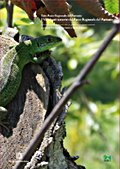I vertebrati terrestri del Parco Regionale del Partenio
The scientific research activities aimed at the creation of a
Biodiversity Observatory in Partenio Park, partly summarized in this
volume dedicated to the terrestrial vertebrates, have been possible
thanks to the implementation of Progetto Integrato Territoriale (through the resources of Measure 1.9, Action c). The project has been
developed according to three main branches. The first branch is
dedicated to activities aimed at the knowledge of the elements forming
the Park biodiversity: such activities include a preliminary stage of
acquisition and study of bibliographic sources and systematic wildlife
and botanical census activities that have led to the elaboration of
updated checklists of the species and thematic cartography. The second
branch is dedicated to the elaboration of biodiversity safeguard and
preservation measures. The third branch is dedicated to the diffusion
of the results, mainly aimed at improving the knowledge and values
linked to the biodiversity of Partenio Park for the benefit of both the
local and scientific communities and with the probably ambitious aim to
become the main supporters of the ecological network in Campania within
Natura 2000 Network. As a matter of fact, the research activities
carried out in the Park - on chiropters first, and on the wolf after -
have been the subject of specific thematic meetings involving the
national scientific community. One of these meetings, dedicated to "The
wolf and the management of the territorial issues", was organized by
Partenio Regional Park Authority within a national workshop held on
18th September 2008 at the Park Offices.
In particular, the research activity dedicated to herpetofauna, characterizing the present volume, has been carried out within a broader survey promoted by the Park Authority to update the knowledge on the biodiversity of the Park territory and establish measures for the conservation of the species. In the last decades, Partenio suffered deep environmental changes that have interested especially the wetlands. Today, it is still possible to find herpetocenoses of great conservation interest at a local and regional level but, in order to face the strong human pressure, it is necessary to urge the implementation of safeguard measures. The Park has recorded the presence of 6 species of amphibians and 10 species of reptiles: according to the literature, there should be 5 species more.
In particular, the research activity dedicated to herpetofauna, characterizing the present volume, has been carried out within a broader survey promoted by the Park Authority to update the knowledge on the biodiversity of the Park territory and establish measures for the conservation of the species. In the last decades, Partenio suffered deep environmental changes that have interested especially the wetlands. Today, it is still possible to find herpetocenoses of great conservation interest at a local and regional level but, in order to face the strong human pressure, it is necessary to urge the implementation of safeguard measures. The Park has recorded the presence of 6 species of amphibians and 10 species of reptiles: according to the literature, there should be 5 species more.

I vertebrati terrestri del Parco Regionale del Partenio
© 2024 - Ente Parco Regionale del Partenio





